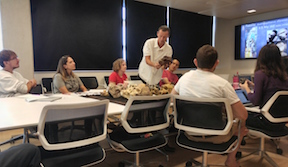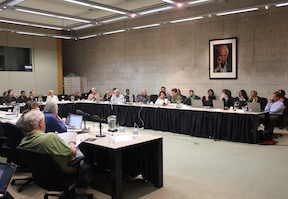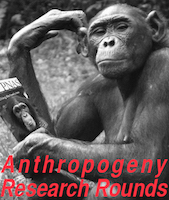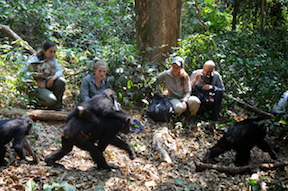Courses
| Title | ID | Year | Quarter | Time | Location | Instructor |
|---|---|---|---|---|---|---|
| Introduction to Anthropogeny Fall 2025 | ANTH 203 | 2025 | Fall | Pascal Gagneux | ||
| Current Topics in Anthropogeny Fall 2025 | BIOM 218 | 2025 | Fall | Pascal Gagneux | ||
| Current Topics in Anthropogeny Winter 2026 | BIOM 218 | 2026 | Winter | Pascal Gagneux | ||
| Current Topics in Anthropogeny Spring 2026 | BIOM 218 | 2026 | Spring | Pascal Gagneux | ||
| Advanced Anthropogeny Spring 2026 | BIOM 229 | 2026 | Spring | Pascal Gagneux | ||
| Anthropogeny Research Rounds All Ongoing | Anthropogeny RR | Ongoing | All | CARTA Office | Pascal Gagneux |
Students participating in the graduate specialization in Anthropogeny are required to take the following courses:
Introduction to Anthropogeny (ANTH 203, formerly BIOM 225)
An overview of key areas in anthropogeny and the current state of research into human origins. The course is transdisciplinary and illustrates the spatial and temporal scales of research on human origins: from million year old phylogenies to millisecond physiological processes, and from human dispersal across continents to cells and molecules. The course specifically addresses a variety of general theories for explaining modern human origins, and introduces graduate students participating in the Anthropogeny specialization, as well as other interested graduate students, to the key questions motivating ongoing research into human origins. It presents our species as one among a large number of primates and stresses the primate heritage of our behavior and biology. Against this backdrop of primate evolutionary roots, the large number of important human specializations are discussed, ranging from biochemistry to social organization.
Lecture topics coordinate between spheres of investigation, e.g. molecules, anatomy, cell biology, development, genetics, and ecology. Extreme care is given to the use of mutually intelligible terminology, a key necessity for integrating different spheres of knowledge. General theories of human evolution will be explored, including theories on: "Machiavellian brain" (i.e. social cognition), "cooking ape" (i.e. diet & technology), "savanna adaptation" or "aquatic ape" (i.e. ecology and physiology), "sexually selected mind" (i.e. mating systems and social organization), "less is more" (i.e. genome evolution by secondary loss of function), "domesticated ape", etc.
Advanced Anthropogeny (BIOM 229)
Students are immersed in the full breadth of the scope of Anthropogeny. The CARTA online Matrix of Comparative Anthropogeny (MOCA) serves as a partial scaffold for this course. This informal database consists of 24 different domains of knowledge grouping over 500 different topics. Each topic addresses a uniquely human trait, as well as traits that are incorrectly claimed to be uniquely human.
- A graduate course open only to Ph.D. students from participating programs at UCSD and enrolled in the specialization.
- Pre-requisite: Introduction to Anthropogeny.
- 10 lectures/discussion sessions.
Current Topics in Anthropogeny (BIOM 218)
Students are required to participate in 6 CARTA symposia held at UCSD and/or the Salk Institute (see Past Symposia):
Each symposium is preceded by a "preview" meeting in which two of the participating students chair the discussion. Following the symposium is a "digest" to discuss the presentations and the students' experiences.
It is highly recommended that track students also participate in the following optional meetings and course:
Anthropogeny Research Rounds
Every last Wednesday of the month, students and faculty meet to discuss new research relevant to human origins. We encourage everyone to bring publications to discuss, ideally from outside their immediate fields of expertise. Research Rounds meetings are not for credit, but they are highly recommended to anthropogeny specialization students as they provide a great opportunity to catch up on recent developments in human origins research and offer an efficient and pleasant way to expand one's horizon.
Anthropogeny Field Course in East Africa (ANTH 289S)
Graduate students in the Anthropogeny track are exposed to the three major approaches anthropologists take to study the origins and adaptations of our species: fossil evidence, comparison with non-humans, and study of human foragers living in environments similar to those in which we evolved. Underlying all three approaches is an appreciation for the importance of the ecological context of human adaptation. Visits to key sites are combined with lectures, discussion, and at Ugalla a brief training/experience in conducting relevant field research. Most Anthropogeny students will not be focusing their research specifically in these domains, and yet they underlie and inform all understanding of the human phenomenon. This course will provide our students with an unforgettable context for their own specializations. Read more about the Anthropogeny Field Course.
Students enrolled in the Graduate Specialization in Anthropogeny must also commit to fulfilling all requirements of the program. Due to considerable time and financial investment by the Faculty of Anthropogeny, along with limited enrollment space, only exceptional personal circumstances will relieve students of this commitment.






